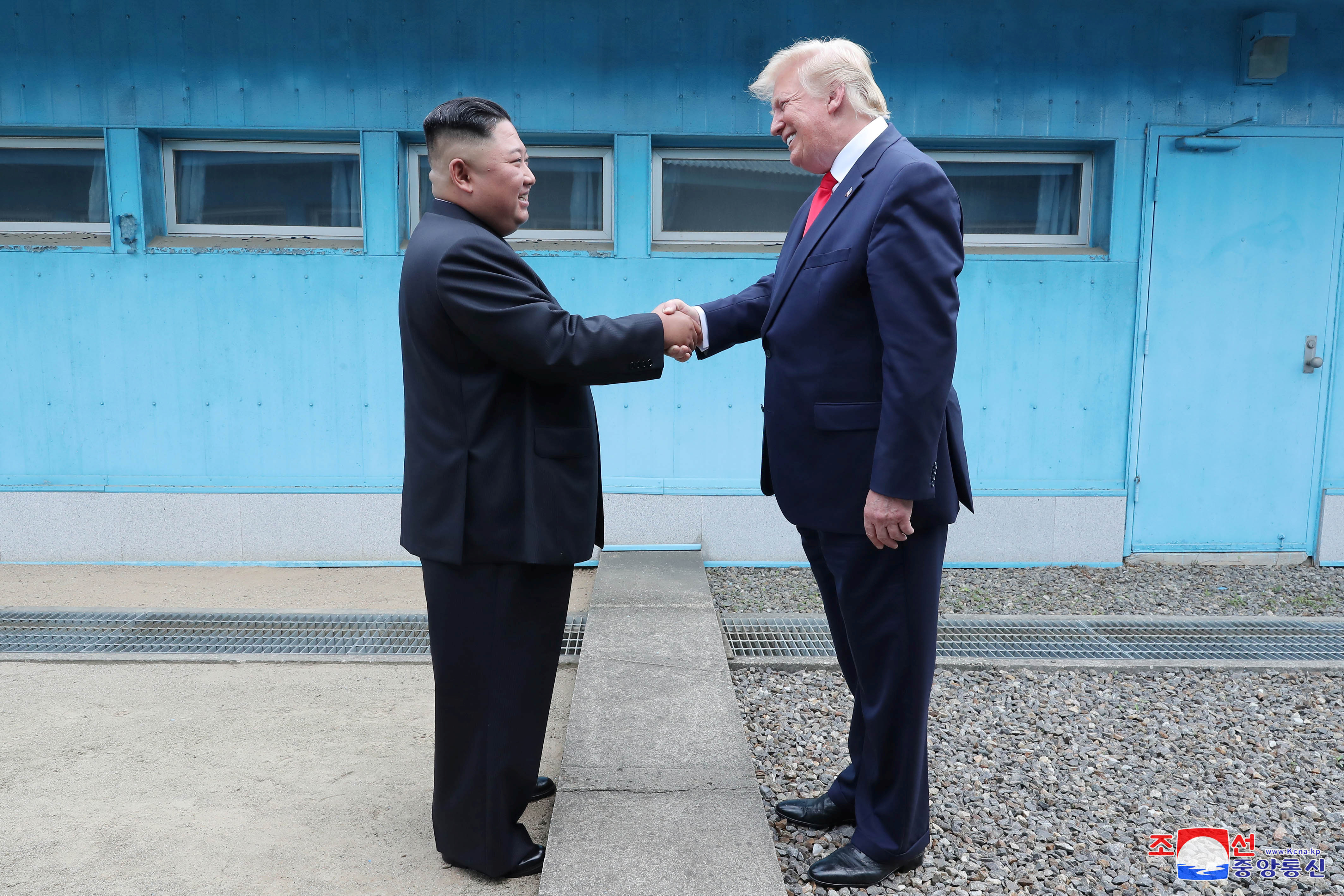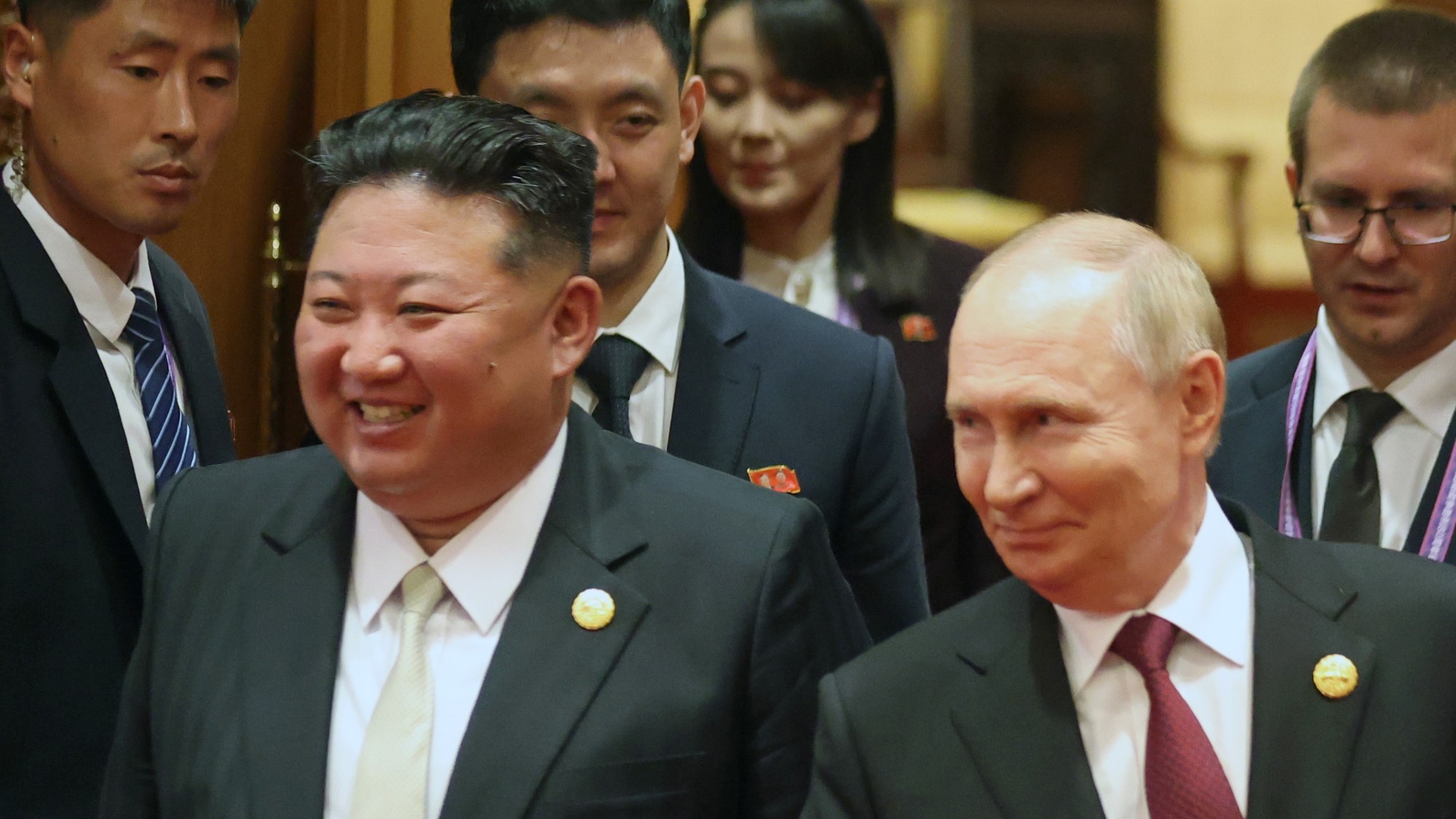Kim Jong Un has President Trump all figured out
The way to Trump's heart is through his ego, and the North Korean leader knows it


A free daily email with the biggest news stories of the day – and the best features from TheWeek.com
You are now subscribed
Your newsletter sign-up was successful
Even when President Trump does the right thing, it still feels wrong.
The "right thing" in this instance is his decision to meet suddenly over the weekend with North Korean leader Kim Jong Un at the demilitarized zone separating North and South Korea. It's the kind of move that runs afoul of all the conventional wisdom about America's foreign policy, but who cares? The president did not get Kim to give up his country's nuclear weapons — although there is now talk of a deal about freezing North Korea's arsenal at current levels — but every moment spent pursuing peace, even elusive peace, is a moment not spent waging a disastrous war.
"I'm really the opposite of a warmonger," Trump proclaimed to South Korean business leaders over the weekend.
The Week
Escape your echo chamber. Get the facts behind the news, plus analysis from multiple perspectives.

Sign up for The Week's Free Newsletters
From our morning news briefing to a weekly Good News Newsletter, get the best of The Week delivered directly to your inbox.
From our morning news briefing to a weekly Good News Newsletter, get the best of The Week delivered directly to your inbox.
That sounds good. Still, it's hard to watch Trump's interactions with Kim and have a not have a bad taste in your mouth, isn't it?
Kim is a ruthless, murderous dictator — the son and grandson of ruthless, murderous dictators. That's not necessarily a reason to object to the weekend summit: You don't have to like somebody in order to do business with them, but you do need to have mutual interests. Kim has an interest in making sure the U.S. doesn't try to end his reign; the U.S. has an interest in limiting the threat posed by North Korea's nukes. Given a chance to make a deal that would end that threat, most U.S. presidents would do well to hold their nose and take the meeting.
What makes Trump's interactions with Kim so distressing is that he doesn't hold his nose. Instead, the president often gives Kim the diplomatic equivalent of a sloppy, wet kiss — and if you object to that imagery, remember that Trump himself has described his relationship with Kim as a kind of romance. At a West Virginia rally last year, Trump said: "I was really being tough — and so was he. And we would go back and forth," Trump said. "And then we fell in love, okay? No, really — he wrote me beautiful letters, and they're great letters."
Indeed, Trump seems to relish any interaction with Kim. Why? Because Kim has figured out how to flatter Trump's ego. The weekend summit may well have been the result of Kim's flattery: Just a few weeks ago, Trump showed Time magazine reporters a "birthday letter" written by Kim and delivered "by hand" to the president. Trump was plainly thrilled. "It's pretty good, right? I mean this is pretty good," he told the reporters (before threatening them with prison if they published the letter's contents).
A free daily email with the biggest news stories of the day – and the best features from TheWeek.com
Kim knows Trump needs coddling. He needs to be loved and praised. Of course, this is probably true of most politicians, but Trump's need for flattery is excessive, more than merely a personal quirk: His personal neediness is now the lodestar of American foreign policy. As a result, old friends and allies are held at arm's length, while rivals and tyrants get the red carpet treatment from Trump.
Shinzo Abe, Japan's prime minister, has proven himself to be a master of the flattery approach: He hangs out at Mar-a-Lago and even nominated Trump for a Nobel peace prize. While Trump has taken digs at Japan's supposed advantage in trade now and again, he has so far avoided adding that country to the list of opponents in his global trade war.
Other leaders who fail to flatter the president end up in his crosshairs, even if they represent longtime allies like Canada or Germany.
Then there's Iran: Logically, there's no reason American policy should be tougher on Iran and kinder to North Korea. The latter country possesses nuclear weapons; the former doesn't. Yet Trump actively scuttled an Obama-era agreement to limit Iran's access to such weapons — the kind of agreement he can't seem to get from Kim. But there are no love letters coming from Tehran, and it seems unlikely that there ever will be. So tensions and talk of war continue to rise in the Persian Gulf.
In the best scenario, the American president — any American president — would be able to do business and pursue peace with Kim without seeming to endorse or make excuses for the North Korean dictator's criminal tendencies. It's difficult to find the right balance between pragmatism and idealism; Trump, as usual, ignores the balance entirely, completely beholden to Kim's flattery.
In North Korea, things have worked out peacefully — for now. That's a good thing, even if Kim gets a propaganda boost from it and even if the underlying goal of denuclearization will probably remain out of reach. But it's difficult to celebrate the lowering of tensions when you come to this frightening realization: America's foreign policy and national security are contingent, in part, on the thickness of President Trump's very thin skin.
Joel Mathis is a writer with 30 years of newspaper and online journalism experience. His work also regularly appears in National Geographic and The Kansas City Star. His awards include best online commentary at the Online News Association and (twice) at the City and Regional Magazine Association.
-
 Local elections 2026: where are they and who is expected to win?
Local elections 2026: where are they and who is expected to win?The Explainer Labour is braced for heavy losses and U-turn on postponing some council elections hasn’t helped the party’s prospects
-
 6 of the world’s most accessible destinations
6 of the world’s most accessible destinationsThe Week Recommends Experience all of Berlin, Singapore and Sydney
-
 How the FCC’s ‘equal time’ rule works
How the FCC’s ‘equal time’ rule worksIn the Spotlight The law is at the heart of the Colbert-CBS conflict
-
 The billionaires’ wealth tax: a catastrophe for California?
The billionaires’ wealth tax: a catastrophe for California?Talking Point Peter Thiel and Larry Page preparing to change state residency
-
 Bari Weiss’ ‘60 Minutes’ scandal is about more than one report
Bari Weiss’ ‘60 Minutes’ scandal is about more than one reportIN THE SPOTLIGHT By blocking an approved segment on a controversial prison holding US deportees in El Salvador, the editor-in-chief of CBS News has become the main story
-
 Has Zohran Mamdani shown the Democrats how to win again?
Has Zohran Mamdani shown the Democrats how to win again?Today’s Big Question New York City mayoral election touted as victory for left-wing populists but moderate centrist wins elsewhere present more complex path for Democratic Party
-
 Millions turn out for anti-Trump ‘No Kings’ rallies
Millions turn out for anti-Trump ‘No Kings’ ralliesSpeed Read An estimated 7 million people participated, 2 million more than at the first ‘No Kings’ protest in June
-
 Kim Jong Un’s triumph: the rise and rise of North Korea’s dictator
Kim Jong Un’s triumph: the rise and rise of North Korea’s dictatorIn the Spotlight North Korean leader has strengthened ties with Russia and China, and recently revealed his ‘respected child’ to the world
-
 Ghislaine Maxwell: angling for a Trump pardon
Ghislaine Maxwell: angling for a Trump pardonTalking Point Convicted sex trafficker's testimony could shed new light on president's links to Jeffrey Epstein
-
 The last words and final moments of 40 presidents
The last words and final moments of 40 presidentsThe Explainer Some are eloquent quotes worthy of the holders of the highest office in the nation, and others... aren't
-
 The JFK files: the truth at last?
The JFK files: the truth at last?In The Spotlight More than 64,000 previously classified documents relating the 1963 assassination of John F. Kennedy have been released by the Trump administration
